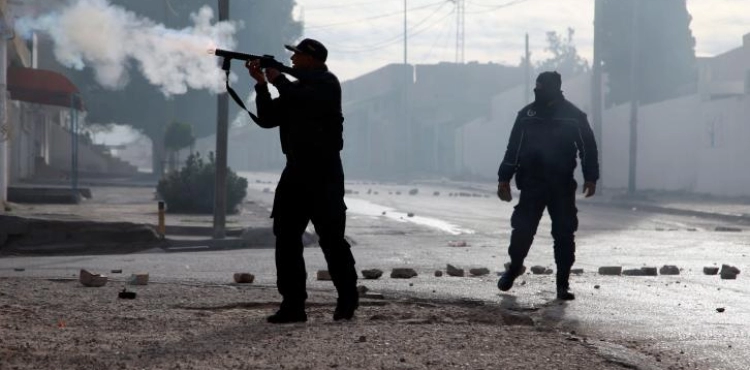Clashes erupted between Tunisian security forces and protesters on Tuesday following the suicide of a burning cameraman in the western city of Kasserine, according to an AFP correspondent.
Security forces fired heavy tear gas to disperse dozens of protesters who had taken the journalist´s body to his last resting place, the source said.
There were confrontations in front of the headquarters of the Kasserine state building, where security reinforcements are intensive.
The center of the city was in a state of tension on Monday night when dozens of protesters set tires rubber, and blocked the road in the neighborhood of light and Habib Bourguiba main street, and responded to them with tear gas, according to an AFP correspondent.
Interior Ministry spokesman Sufian al-Zaq said Tuesday that six members of the security forces were slightly wounded during the clashes on Monday night, referring to the arrest of nine people.
Abdel Razzak Zerqi, a photographer, died after setting fire to himself on Monday evening to protest against unemployment and deteriorating conditions in the Kasserine region.
"For the sons of the Kasserine who have no livelihood, today I will make a revolution, I will set fire to myself," Zarki said in a video before his death.
The region was calm on Tuesday morning.
The two minors were among the first cities where social protests broke out in late 2010, during which police forces killed protesters before demonstrations spread in Tunisia and ousted President Zine El Abidine Ben Ali´s regime.
The National Union of Journalists said in a statement on Monday that "the journalist photographer Abdel Razzaq Zerqi died after being shot in the body as a result of harsh social conditions and the closure of the horizon and lack of hope" salinity steps escalating may reach the general strike in the sector.
Despite progress in the democratic transition after the overthrow of the Ben Ali regime in 2011 and a return to growth after years of stagnation, Tunisian authorities find it difficult to respond to the social aspirations of citizens.
Inflation, fueled mainly by the devaluation of the dinar and unemployment still above 15 percent, is fueling the social unrest that led to riots in January 2018 in many Tunisian cities.












